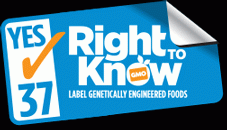As a historic vote with profound implications for the future of our food system nears, the question becomes whether a campaign with limitless resources and a disdain for the truth can defeat an overwhelmingly popular idea supported by a grassroots army, and over 3000 public interest organizations : the right to know what's in the food we eat and feed our families.
Poll after poll showed 90% of Americans (and Californians) favored labeling foods that have been genetically engineered (GMOs) and nearly a million signatures were gathered by California volunteers in just 10 weeks -- easily qualifying Prop 37 for the ballot. And as of the first week of October, the Yes on 37 campaign enjoyed a 2 to 1 lead in the polls.
This broad statewide (and national) support -- across party lines - made perfect sense. Prop 37 posits a simple question: Do we have the right to know what's in the food we eat and feed our children, or is that a decision better left to the pesticide and junk food companies bankrolling the opposition campaign?
Prop 37 isn't a referendum on genetically modified foods. It's not a ban, or a warning, it's a label.
The debate over the efficacy of genetically engineered foods should and will continue. In the meantime, Californians have a right to know, and for good reason.
A growing body of research links GMO foods to potential health risks , increased pesticide use , biodiversity loss , the emergence of " super bugs " and " super weeds " and the unintentional contamination of conventional crops.
Prop 37 simply adds a line of ink to a label -- as is currently required for 3,000 other ingredients -- so consumers know which products have been altered in a laboratory. 61 other countries have provided their citizens with this right, and choice, it's time we do the same.
Corporate Backlash Against Our Right to Know
In response to this growing outcry for food transparency a who's who of the world's most notorious corporate bad actors, with long histories of deceiving the public, polluting the environment, and endangering public health, converged on California to convince us we don't deserve this basic, human right. A right that nearly half the world's population already enjoys.
The No on 37 campaigns two largest contributors are pesticide giants Monsanto ($8.1 million) and Dupont ($5.4 million) -- who for decades assured us Agent Orange, DDT, and Tobacco were safe. At the same time, Monsanto has actively advocated for labeling in Europe.
So how do companies like these go about persuading us that we don't deserve the right to know what they're doing to our food?
The Only Recourse: An Unprecedented Campaign of Deception
The campaign against the right to know has relied on three essential components: unlimited resources, a willingness to repeatedly lie, and a willingness to double and triple down on those lies--even when they are debunked by independent fact checkers.
Seriously, when was the last time giant, out-of-state pesticide and junk food companies spent $45 million to improve your health, protect the environment or save you money?
Spoiler Alert--they never have.
(Note: You can view every article as one long page if you sign up as an Advocate Member, or higher).





